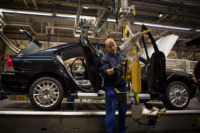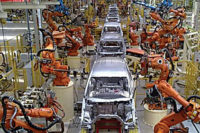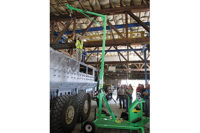Countries around the world share a common goal of reducing carbon emissions. Finland, for example, aims to reduce its level of emissions by 5 percent (5 million kilograms) each year by investing in green technology for public transportation.
The capital city of Helsinki is leading the way in this endeavour, beginning with the purchase and operation of 33 electric buses this past summer for the Helsinki Region Transportation Authority (HRTA). The HRTA is responsible for maintaining the public transportation network of nine cities in the capital area. The buses are made by Yutong Bus Co. Ltd., which is based in Zhengzhou, China.
“China is very advanced in the development and production of electric buses, with Yutong [being] the world’s largest manufacturer,” notes Heikki Alanko, managing director of Pohjolan Liikenne, one of Finland’s largest public transport operators. “The battery [in the bus] has good performance, large storage capacity and a fast charging speed. According to our estimation, after full charge, it can support at least 200 kilometers of driving even under harsh conditions.”
Composite skirt and side panels made by Exel Composites Oyj lighten the bus, resulting in less energy consumption and lower lifetime maintenance costs. Headquartered in Vantaa, Finland, Exel designs and manufactures fiberglass and carbon fiber profiles of all sizes—including some of the largest and most complex on the market. Exel worked closely with Yutong to develop the exact composite panels needed for this application.
“The light weight of fiberglass was important to this project as it reduces operating costs, and helps to increase energy efficiency and environmental sustainability,” according to Kathy Wang, head of sales for North Asia at Exel Composites. “Additionally, our composite profiles are resistant to deformation, chemicals and harsh road environments, [and] repairing [them] is straightforward and can be done in a depot. This decreases the overall operational and lifetime costs of the buses.”
Prior to contracting with the HRTA, Yutong extensively tested its buses in China’s northernmost province, Heilogjiang. This area has a winter climate similar to Finland’s.
Yutong’s summer delivery of its electric buses not only marks the company’s first time in the Finnish market. It also represents the largest volume of buses that Finland has purchased from overseas, as well as the first of many such purchases. The country aims to have 400 electric buses operating in the capital by 2025.
Yutong is the first listed bus company in China (in 1997), and it has an excellent track record in the “new energy” bus industry. As of July 2019, the company sold 120,000 electric buses worldwide, including more than 8,000 in Europe. In 2018, its large and medium-sized passenger vehicles had a global market share of 13 percent.
Exel’s wide range of carbon fiber, fiberglass and hybrid composites are used both externally and internally in cars, buses, trams, trains, trucks and trailers. Company engineers design these materials into customizable products that optimize weight, cost, performance and safety, including ceiling panels, air conditioning ducts and heating vents. For more information, call 800-849-3286 or visit www.exelcomposites.com.





